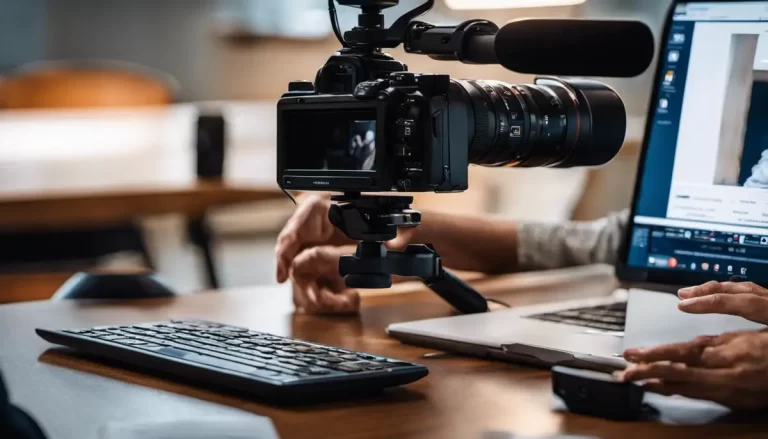Are you fascinated by the legal world? Do you have lightning-fast typing skills and an eagle eye for details? If so, then a career as a court reporter might be just the right fit for you! Court reporters play a crucial role in our justice system, capturing every word spoken during legal proceedings with impeccable accuracy. But what does it take to be a successful court reporter? In this blog post, we’ll explore the essential abilities that every aspiring court reporter must possess. So grab your stenography machine and let’s dive into the captivating world of court reporting!
Court reporters need to have excellent transcription skills
One of the most critical abilities for a successful court reporter is having excellent transcription skills. As the gatekeepers of legal proceedings, court reporters must accurately transcribe every spoken word into written form. This requires a keen understanding of various shorthand techniques and proficiency in using stenography machines.
Transcription skills go beyond just typing quickly; they also encompass accuracy and attention to detail. Court reporters need to be able to capture not only the words being spoken but also any nuances or inflections in tone that may impact the meaning of the testimony.
In addition to speed and precision, court reporters must also possess strong grammar and punctuation knowledge. They are responsible for creating clear and coherent transcripts that can be easily understood by attorneys, judges, and other parties involved in a case.
Furthermore, court reporters often encounter complex legal terminology during their work. Being well-versed in legal jargon is essential for ensuring accurate transcripts that reflect the true nature of each proceeding.
To stay on top of their game, court reporters must continually refine their transcription skills through practice and ongoing education. This commitment to excellence allows them to provide reliable records that serve as crucial evidence in our justice system.
With their exceptional transcription skills honed over time, court reporters ensure that no word goes unrecorded – preserving justice one transcript at a time!
They must be able to type quickly and accurately
Court reporters are often tasked with the challenging job of transcribing spoken words into written records. To excel in this role, they must possess exceptional typing skills – both in terms of speed and accuracy.
When it comes to typing quickly, court reporters need to be able to keep up with the fast-paced nature of legal proceedings. They should be proficient at touch-typing, allowing them to effortlessly navigate their way around a keyboard without constantly looking down at their fingers. This enables them to focus on capturing every word accurately and efficiently.
To ensure accurate transcription, court reporters often utilize specialized stenography machines or computer-aided transcription software that allows them to input text using shorthand symbols or phonetic codes. These tools help streamline the process while maintaining precision.
Being able to type quickly and accurately is one of the foundational abilities necessary for success as a court reporter. It allows them not only to keep pace with proceedings but also deliver precise transcripts that serve as crucial documentation in various legal settings.
Court reporters need to have excellent listening skills
One crucial ability that court reporters must possess is excellent listening skills. In the fast-paced environment of a courtroom, it’s essential for court reporters to be able to capture and transcribe every word accurately.
When witnesses testify or attorneys present their arguments, court reporters need to listen attentively and remain focused on capturing all the details. They must have the ability to discern between different speakers and accurately attribute each statement accordingly.
Not only do court reporters need to listen carefully, but they also need to be able to understand technical terminology and jargon used in legal proceedings. This requires them to have a strong command of language and an extensive vocabulary.
Court reporters must also be skilled at distinguishing similar-sounding words or phrases that may alter the meaning of a statement if transcribed inaccurately. This attention to detail is necessary for producing accurate transcripts that are relied upon by judges, attorneys, and other legal professionals.
Additionally, court reporters often encounter challenging audio conditions such as background noise or multiple people speaking simultaneously. Despite these obstacles, they must maintain their focus on capturing every spoken word with precision.
Impeccable listening skills are vital for any successful court reporter. By actively engaging in the proceedings with sharp hearing abilities and acute attention to detail, they can produce accurate transcripts that serve as important records in our justice system.
They must be able to pay attention to detail
Court reporters must have impeccable attention to detail. Every word, every gesture, and every action that takes place in the courtroom must be accurately captured and recorded. This requires a keen eye for nuances and the ability to pick up on even the smallest details.
In a fast-paced courtroom environment, paying attention to detail becomes even more crucial. There may be multiple people speaking at once or witnesses providing important testimony. Court reporters need to focus their attention on each speaker and capture their words with precision.
Not only do court reporters need to pay attention to what is being said, but they also need to observe body language and non-verbal cues. These subtle signals can often provide valuable context or indicate emotions that may not be fully expressed verbally.
Additionally, court reporters must meticulously review their transcripts for accuracy before finalizing them. They need to ensure that all names are spelled correctly, punctuation is accurate, and grammar is correct. Even the slightest error could have significant consequences in legal proceedings.
Having a sharp eye for detail is an essential skill for court reporters. It enables them to accurately capture proceedings and provide reliable records of events in the courtroom.
Court reporters need to have good people skills
Good people skills are essential for court reporters to excel in their profession. As they interact with a variety of individuals, including judges, lawyers, witnesses, and defendants, the ability to communicate effectively is crucial.
One aspect of good people skills is being able to establish rapport with others. Court reporters must create a comfortable and professional environment for all parties involved in the proceedings. This involves being friendly yet maintaining appropriate boundaries.
Another important skill is active listening. Court reporters need to listen attentively to ensure accurate transcription of testimonies and statements. They must be able to pick up on nuances in speech patterns and tone that may not be captured by written words alone.
Furthermore, court reporters should possess empathy toward those they work with. They often come across emotionally charged situations or sensitive topics during trials or depositions. Having empathy allows them to approach these situations with sensitivity and understanding.
Flexibility is another key attribute for court reporters when working alongside different personalities and adapting to various courtroom settings or legal proceedings. Being adaptable enables them to tailor their communication style accordingly.
Having good people skills enables court reporters not only to perform their job accurately but also help build positive relationships within the legal community—a valuable asset for success in this field!
They must be able to work well under pressure
Working well under pressure is a crucial ability that court reporters must possess. When in the courtroom, there can be tense situations and high-stakes proceedings, making it essential for court reporters to stay calm and focused.
One aspect of working well under pressure is being able to meet tight deadlines. Court reporters often have strict time constraints when transcribing documents or producing transcripts. They need to be able to work efficiently without sacrificing accuracy.
Additionally, court reporters must be adaptable in stressful situations. They may encounter unexpected challenges during proceedings, such as technical difficulties or difficult-to-understand speakers. Being able to think quickly on their feet and adjust their approach is vital for success.
Another important skill when working under pressure is maintaining concentration for extended periods of time. Courtroom proceedings can last for hours, so court reporters must remain attentive throughout the entire session while capturing every spoken word accurately.
Effective stress management techniques are essential for court reporters who work in high-pressure environments. This could involve practices like deep breathing exercises or finding moments of relaxation during breaks.










